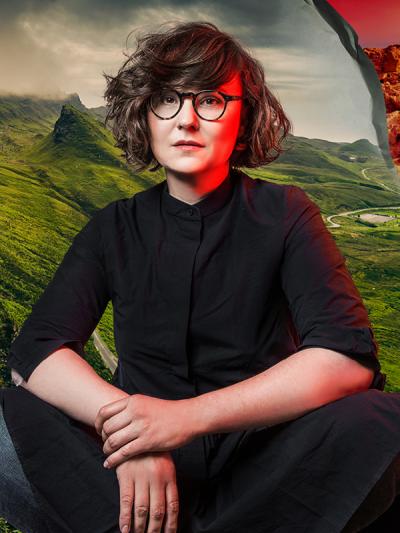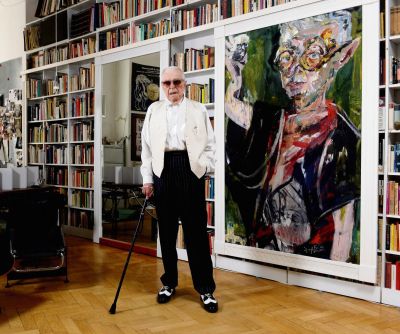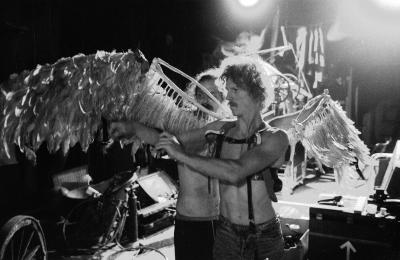Words are music – language is a voice: Marta Górnicka and the political choral theatre

Professionals and non-professionals, actors, adults and children, with and without a history of migration, old and young, white and black, with and without disability, people of different religious or political views and ethnic backgrounds: On 3 October 2018, Marta Górnicka assembles around 50 Berliners from various social backgrounds for the premiere of the choral piece “DAS GRUNDGESETZ” (“THE BASIC LAW”) on the open-air stage at the Brandenburg Gate. It is the Day of German Unity. And in the middle of the high-spirited hustle and bustle of the celebrations of the German national holiday, the sounds of the fanfare processions marching on the stage ring out whilst the spoken choir lines up in the background.
One single voice begins to chant the preamble of the German Basic Law, a second joins in with the keyword “Frieden” (“peace”). By contrast, the subsequent passage „das gesamte deutsche Volk“ (“all the German people”) is a multi-voice part encompassing the entire ensemble. But Marta Górnicka’s central thesis really becomes clear in the Libretto: The German constitution is not the object of an ethnically homogeneous unit, but of a heterogeneous community of individuals. There follows a rhythmical flow through the German Basic Law which in Górnicka’s choral piece is performed in extracts. Sometimes in motion, sometimes facing the audience, one voice, two voices, several voices and at all times heavy with the meaning of its subject matter: Inviolable dignity, freedom of religion, freedom of opinion, equal rights for men and women, right of asylum for the politically persecuted, right to resist… As announced in the programme of the Maxim Gorki Theatre, which was the first theatre to stage the spectacle, the text of the German constitution is exposed to extreme forces in this production: Górnicka, who directs her spoken choir live in front of the stage dressed completely in black and energetically jerking her arms in the air, divides and distributes the passage, allows individual sentences to be performed by various voices in a frantic commotion, emphasises individual words, has them repeated energetically, really hammers them home, expands them or rhythmicises them. A choral stress test. A performative endurance test which bears the distinctive character of its creator.
The Polish director, singer and choral theatre specialist is celebrated internationally for this type of artistically innovative and highly political theatre work involving semi-professional ensembles and, in recent years, has become a true Polish cultural export success. Marta Górnicka, who was born in Włocławek in 1975, trained at the Production faculty at the Aleksander Zelwerowicz Theatre Academy, at the Fryderyk Chopin University for Music, the university in Warsaw and the National Drama School in Kraków. In 2009, with the support of the renowned Warsaw Zbigniew Raszewski Theatre Institute, she developed her own vocal and action exercises for voice and body, and in 2010, founded the innovative “Chór Kobiet” (“Women’s Choir”) made up of 25 women ranging in age and profession. She did not have to wait long for her early works to become a success: In the same year, she staged her first production “Tu mówi chór” (“The choir is speaking”), which expresses the frustration of several generations about the clichéd images of women in Western consumer societies and the Christian ideal of femininity. This was followed a year later by the choral piece “Magnificat”, a critique of woman’s position in the strictly Catholic Polish society, for which she received the award for best up-and-coming European director at "Fast Forward – European Festival for young directors" at Braunschweig State Theatre. She then wrote her first piece in German at the Braunschweig Theatre: “M(OTHER) COURAGE”, which was first performed in 2015 and which was inspired by Bertolt Brecht’s original but translated into our more recent political reality. This was followed in 2016 by her choral piece “KONSTYTUCJA NA CHÓR POLAKÓW” (“Constitution for the Choir of Poles”), on which her later production and German equivalent “THE BASIC LAW” was to be based. One year later the premiere of her (Polish language) piece “HYMN AN DIE LIEBE (HYMN DO MIŁOŚCI / HYMN TO LOVE)”, in which she deals with the increasing nationalist tendencies in her home country and in Europe, was held in the Maxim Gorki Theatre in Berlin. In 2018, Górnicka made her directorial debut at the Münchener Kammerspiele with “JEDEM DAS SEINE. EIN MANIFEST”, (“TO EACH HIS OWN. A MANIFESTO”) in which subjects like neofascism and anti-feminist counterreaction against the female body took centre stage.
[1] The text of the preamble of the Basic Law of the Federal Republic of Germany was edited slightly for the performance by the director and is reproduced here in its amended form. In the original, the passage reads: “Conscious of their responsibility before God and man, inspired by the determination to promote world peace as an equal partner in a united Europe, the German people, in the exercise of their constituent power, have adopted this Basic Law.”


